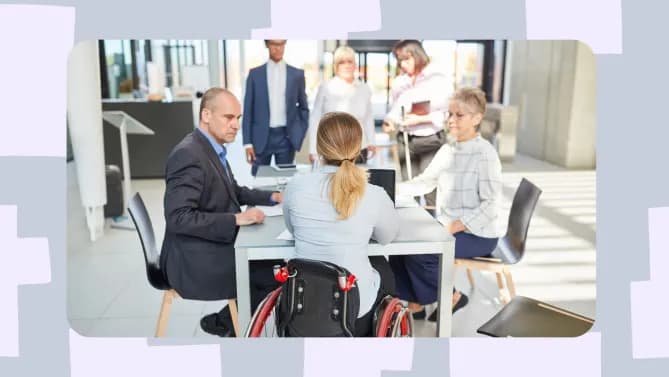I Face Ableism in the Workplace — Here's What I Wish My Company Did Differently
Ableism is defined as "discrimination in favor of able-bodied people." According to the US Census Bureau, 54 million Americans have a disability and people with severe disabilities working full time earn approximately $1,000 less per month than non-disabled workers. Meanwhile, 13.3 million people with disabilities between the ages of 16 and 64 have experienced difficulty finding employment in the first place because of their disability.
Because of factors like these, there's a 70% unemployment rate among people with disabilities.
The discrimination or oppression of individuals with disabilities, intentional or unintentional, has no place in the workforce. The Equal Employment Opportunity Commission (EEOC) is tasked with monitoring disability-related workplace discrimination, as well as employment discrimination complaints on all accounts—race, color, sex, age, religion, retaliation, pay equity, genetic information, and national origin. The EEOC said charges of job bias related to disability dropped to 26,838 in 2017 from an all-time high of 28,073 the year prior, which is progress, but that's still a hefty number. As for 2017, 31.9 percent of the 84,254 total charges cited disability discrimination. Of those disability-related cases, 5,540 were resolved in favor of the person who brought the complaint, and the agency secured $135.2 million in monetary benefits for them.
But it doesn't always work out that way, and companies can typically do a better job at handling employees with disabilities. In fact, employers with 14 or fewer employees, as well as all state employers, are exempt from federal restrictions against discrimination on the basis of disability in employment.
This means that small employers can refuse to employ someone simply because they are sitting in a wheelchair.
"I have faced ableism in the workplace when I worked for companies and with other people," explains Alison Carville, a sole practitioner of Carville Communication Consulting, and a woman who uses a wheelchair. "Such examples are not allowing me extra time to complete certain tasks required by my job or allowing me a notecard to help me remember certain processes while in job training. I always had to ask coworkers for certain things in high cabinets and make sure my wheelchair wasn't in 'their' way."
She's also experienced and witnessed discrediting of her own and others' autonomy, she says.
"People have cut in front of me when I'm about to perform a task, and it ends up often physically hurting myself and the other person," she explains. "They 'just wanted to help,' but since we did not communicate, neither of us knew what the other was doing."
Carville says she feels privileged that people can at least see her disability. Meanwhile, 88% of the disabilities that afflict people today are not visible.
In those circumstances, the average person often would not know there is a person with a disability in their office. Because of that, Carville says that many people think just building a ramp on a building with steps is the one-and-done way to fix ableism, but they forget about braille, seeing-eye dogs/assistant dogs, ergonomic workspaces, easy-to-grip tools, closed captions, class note-takers, recording devices for lectures and all the other ways companies could improve their workspaces and make them more accessible for those with disabilities.
"Words matter," she also adds. "Using words like 'see, stand, run,' etc. might have nothing to do with an action, but people can say things like 'advocate for,' or 'enter in a race/election,' etc. instead."
And, speaking of communication, always asking and prying for the "sob story" of how one became disabled is inappropriate, she advises.
"Most people were born with their disability, and it's what we know, so there was no major life adjustment, except in the case of inaccessible environments," she explains. "There isn't always a sob story to tell to an able-bodied person to pity us from that moment forward."
In essence, ableism doesn't only mean not hiring someone for their disability; it also means disregarding one's disability, disrespecting someone for their disability, and making assumptions about one's disability. Only when we stop defining people with disabilities as "disabled people" instead of referring to them as "people with disabilities," and when we start making the accommodations necessary for them to perform their responsibilities (because they can if provided the aforementioned "fixes"), will all employees be treated with the same respect.
--
This article reflects the views of the author and not necessarily those of Fairygodboss.
AnnaMarie Houlis is a multimedia journalist and an adventure aficionado with a keen cultural curiosity and an affinity for solo travel. She's an editor by day and a travel blogger at HerReport.org by night.
What's your no.1 resource for educating about ableism in the workplace? Share your answer in the comments to help other Fairygodboss members!
Why women love us:
- Daily articles on career topics
- Jobs at companies dedicated to hiring more women
- Advice and support from an authentic community
- Events that help you level up in your career
- Free membership, always
